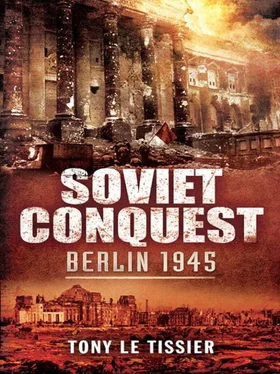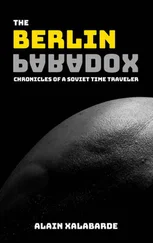At the same time our thrust forward was complicated because the left flank remained open as our troops got nearer to Berlin. To our left, moreover, was the strong enemy group at Frankfurt an der Oder. Shalin had reported having received from the reconnaissance the alarming report that the Fascists had concentrated about 100,000 men near Frankfurt, thus having considerable forces for an attack on our flanks.
We had vainly hoped that the advancing troops of the 1st Ukrainian Front would hit the Frankfurt group further left of the 1st Byelorussian Front. However, they had not yet reached the area, so Dremov had to split his forces. While his brigades pressed forward as before on Berlin’s outer defensive ring, they constantly had to fight off attacks from the flanks. The enemy fought so bitterly that the elements that we had committed to the development of the thrust on Berlin had to be deployed on the left flank and brought into the battle. In doing so the forces of the 1st Guards Tank Army were weakened because of the 11th Guards Tank Corps having to support the 5th Shock Army after the breakthrough.
The counterattack eased off. If this continued, an appreciable thrust by the Mechanised Corps could not be counted on. Something must have happened. I briefed Zhukov on the situation by telephone and asked him to send us any kind of troops to cover our left flank and release Dremov’s corps. Zhukov did not reply immediately. Apparently he was looking for a solution: ‘There is a cavalry corps in my reserves. I will give the order immediately. The cavalry will come to you. And another thing: Guard your flanks firmly on your advance. Otherwise it will go badly not only for your army but for the rest of the Front’s troops.’
The cavalry corps did not keep us waiting long. A little later it relieved the flanks of the engaged brigades of the Mechanised Corps and markedly improved their situation. The troops of the 1st Ukrainian Front were approaching the outer defensive ring of Berlin with us, so that we were able to make contact with the advancing 3rd Guards Tank Army of General Rybalko.
On the evening of the 20th April Army Headquarters received the following telephone message from the Front Commander:
Katukov, Popiel!
To the 1st Guards Tank Army falls the historic task of being the first into Berlin and hoisting the banner of victory. I task you personally with its fulfilment. Send the best brigade from each corps to Berlin and give them the task of breaking through the city boundary at the latest by 0400 hours on the 21st April.
Zhukov, Telegin.
As ordered, I entrusted the best brigades of our army, the 1st and the 44th, with this task. The way to the German capital led through woods on the one road flanked by a chain of lakes. In the burning woods the smoke made breathing and visibility difficult. Everywhere lurked carefully camouflaged guns and hidden soldiers with Panzerfausts . Marching infantry at the head of the brigades destroyed these obstacles, finally opening the way to Berlin for the tanks.
In the night leading to the 21st April the brigades covered 25 kilometres via Erkner and opened the battle for the outer defensive ring of the German capital. Babadshanian’s corps went round Karlshorst, while Dremov thrust into Köpenick with Chuikov’s infantry. Simultaneously Bogdanov’s tank-men and Bersarin’s infantry broke through the northern suburbs.
During the fighting for Erkner, Babadshanian reported by telephone: ‘I have some Japanese here, Comrade Commander-in-Chief.’
‘What kind of Japanese, then? Where do they come from?’ I asked, not understanding.
‘They are apparently diplomats from the Japanese Embassy in Berlin.’
‘Bring them here.’
One hour later the whole diplomatic mission appeared at my command post, repeatedly bowing and smiling. From their appearance they were uncertain whether we would receive them in a friendly manner. Added to this was the anxiety that they had felt in crossing the front line. One diplomat, a man of medium size, declared in painful Russian that they were members of the Japanese Embassy and had decided to seek protection and assistance from the Russian high command.
‘We want to go back to our home country,’ he concluded.
Although I was not inclined to be helpful to representatives of a country allied to our enemy, I saw that to avoid diplomatic complications I was obliged to provide a means of transport for these refugees and send them on to the Front Headquarters.
During the fighting in Berlin later I experienced a further ‘diplomatic’ incident. Gussakovski’s brigade had broken through cellars and passages to a building from which German machine-gunners were firing. The tank-men came across cases of Brambach mineral water in the cellars of these buildings. Hot and thirsty from the fighting, they emptied several bottles. As it later transpired, this mineral water belonged to the embassy of a neutral state, whose employees had nothing better to do than write us a formal letter of protest. I could not understand these diplomats that would not even allow our soldiers some bottles of mineral water while they were risking their lives in the battle against the Fascists.
The fighting flared up on the German capital’s outer defensive ring. We had to overcome a whole system of fire nests, bunkers, obstacles, barricades and booby traps in a storm of fire. We passed minefields and barricades in an area in which the enemy had prepared every building for defence.
Our sappers had it particularly difficult. As the Fascists had destroyed all the bridges in their retreat, we were obliged to construct crossing facilities over numerous rivers, lakes and canals.
But nothing could shatter the attacking spirit of our soldiers. All attempts by the Fascists to scare them remained unsuccessful, as also did this leaflet: ‘You are not far from Berlin, but you will never enter our capital. Berlin has 600,000 buildings and every one of them is a fortress that will become your grave.’ But the wind scattered the leaflets and, as every day passed under the mighty blows from our troops, the alleged claim that Berlin was unobtainable was further reduced.
How many Soviet soldiers had dreamed that the war would end in Berlin, and for how many was this dream unfulfilled! But now the Reich capital was within reach. The distances on the kilometre stones and the signposts became ever less. At a crossroads I read, hastily written in chalk, ‘To the Reichstag 15 km.’ But what kilometres!
In Berlin there were over 500 strongpoints in various buildings. They covered themselves mutually with fire and were connected by passages to points of resistance, defensive positions, strips and sectors. We virtually had to take a fortress with 300,000 defenders. Elite Fascist units and a Hitler fanatic element of the population were defending the city. Berlin then embodied for us Fascism in all its bestiality. Our soldiers and officers were only animated by one wish: to put an end to this once and for all, that which had inflicted so much pain on our people.
As was reported to me, many of the lightly wounded were secretly creeping away from the field hospitals in order to participate in the last of the fighting. I understood them only too well. Who did not want to participate in the storm on the German capital?
I worked my way up to Köpenick with an operational team late at night. The enemy was shelling this part of the city ceaselessly to prevent a concentration by our troops. Before us lay the last water obstacle: the Spree River. Would the scouts be able to take the bridge in time? On the 23rd April Dremov’s command post was in the cellar of a half bombed-out house right on the bank of the Spree. The corps commander looked tired. He reported that the bridge had been blown. A newly formed special detachment had forced the river in order to cover the sappers constructing a crossing point.
Читать дальше












